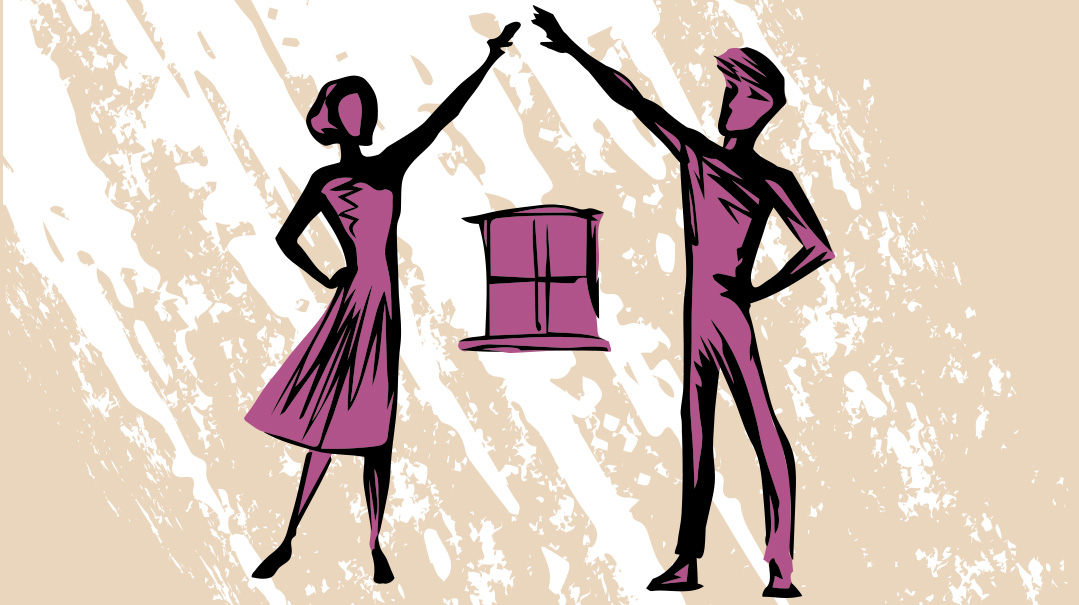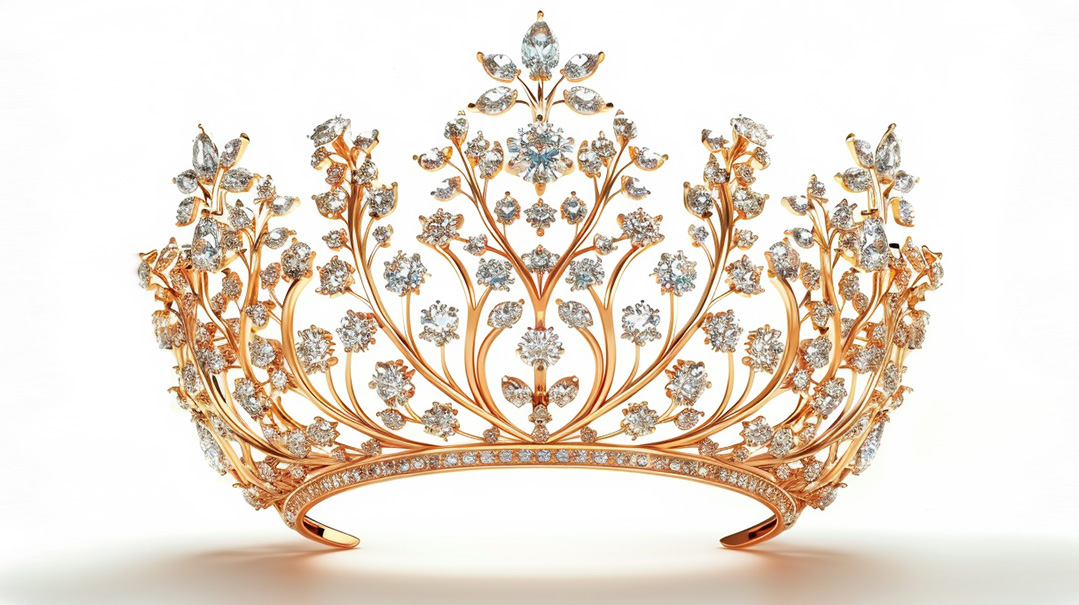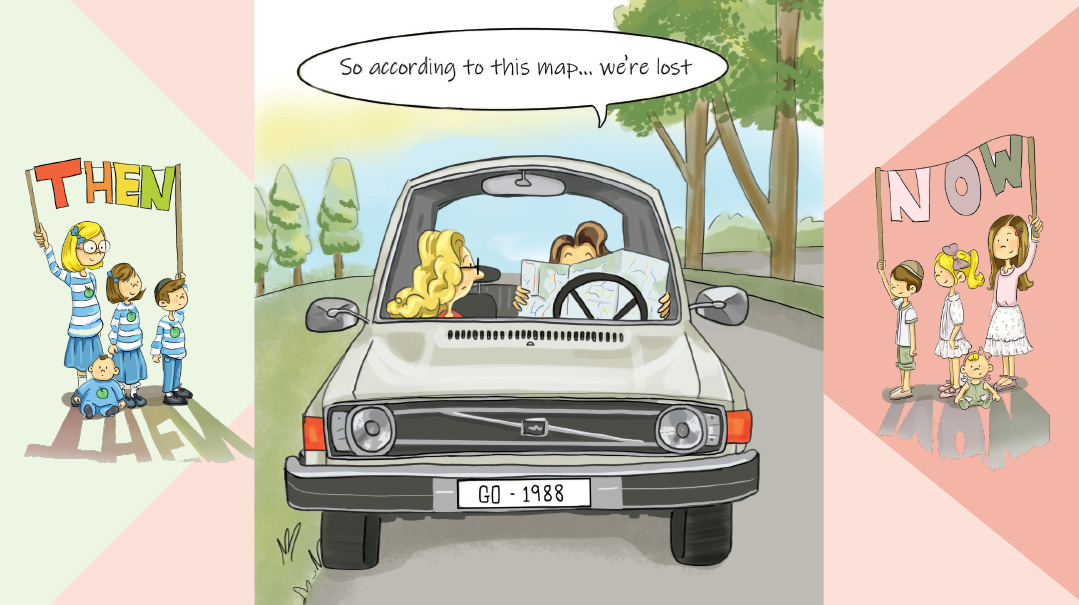How I Saved My Marriage
| September 10, 2022Three women share their stories of struggle, and what they did to reconnect and rebuild happier marriages

Malky’s Fix
I was 23 when I met Eliyahu. Our dates were positive, and as the dating progressed, we began to share on a deeper, more personal level. Eliyahu opened up about his childhood, which was full of abuse, dysfunction, neglect, and poverty.
He had worked on himself and was determined to avoid the mistakes he’d witnessed in his parents’ home. He promised me that if anything ever came up, he’d get help. He wouldn’t let his own family have a home like that.
Eliyahu was very transparent about everything, and his openness put me at ease. If anything, it made me want to be the person in his life that would care for him in a way that no one else had until this point. I thought that maybe by marrying someone like me, who grew up in a healthy home, he’d be able to fully heal.
We married in February, and by November, I’d given birth to a preemie at just 32 weeks. That threw us for a loop. Even after my newborn son was released from the NICU, he was still a high-needs baby. I was going through a lot, and Eliyahu wasn’t helpful in the way that I needed him to be. Instead, he was focused on providing for us and was working crazy hours.
Part of growing up in poverty is the anxiety at the prospect of having to relive it. My husband always gave work his full attention and rarely said no to a job opportunity. This meant that he was frequently out of the house and busy on the phone.
Eliyahu and I came into marriage with different expectations. In my home growing up, everyone had such different schedules that it never made sense for us to have dinner together. There was food in the freezer, and everyone made whatever they wanted. My husband expected supper. I couldn’t understand what the big deal was. He kept feeling that I wasn’t doing what he needed, and he felt unloved. We had completely different love languages and ideas of what it means to love someone.
We had two more kids, and things only got worse. We were in an endless negative cycle. He would feel unloved, get depressed, and then emotionally withdraw for several weeks. Eventually things would go back to normal, so I’d think everything was okay, but then he’d share his pain with me, and I would be consumed with guilt. It felt like no matter what I did or tried to do, it was never enough. I was never enough.
Then my cycle of negative emotions would start. Why is everything so difficult? Why doesn’t he do his part during bedtime? Why can’t he pay attention to me? When is he going to put his phone away? Why is he so critical? Where am I going wrong that he’s so unhappy?
We tried going to a therapist, but it made things worse because the therapist was focused on the problems instead of helping us find solutions.
Amid all of this, I got the news that my mother was sick. I understood she wouldn’t be with us for much longer, and indeed, she passed away a short while later. Now I was grieving her loss, and still struggling in my marriage.
I needed a mother figure in my life, so a good friend suggested I try “Marriage Buddies,” a program by Michal Fruchter that matches up veteran married women with women who have been married for less than ten years.
My mentor, Miriam, was a woman I respected and looked up to. Because she had also faced challenges in her marriage, she understood where I was coming from and knew how to speak to me. She gave me practical tools to change my inner voice: she taught me to love myself, not to take things too personally, and to feel confident in what I was doing for our marriage.
Miriam recommended I begin complimenting my husband for every positive thing he did, and that really made a difference. I’d make eye contact and say things like, “Thank you for putting your phone away. Thank you for spending time with me.”
I also put into practice the idea of actively respecting my husband. If he disciplined the kids, I stood by his decision and no longer got upset at him for the way he parented our children. That was sometimes very hard, but again, it made a huge difference in our relationship.
Whenever I was able to stop myself from focusing on the negative in my marriage, it felt like a genuine victory. For example, when my husband took a break from work for ten minutes to spend time with me, I’d think, Why is he only giving me ten minutes? So, I practiced feeling grateful for those ten minutes and then expressed that gratitude to him. He naturally reciprocated by giving to me in ways that he knew I would appreciate.
In the past, my husband wanted me to go for help, but I resisted because I thought he was the sole problem. But I’m so glad I got help from my mentor because now I recognize the important role I play in our marriage; although there were many ways my husband created disconnection in our marriage, my response to his actions and words was also creating distance.
I now understand that when someone is critical, there’s often a whole lot more going on inside that possibly has nothing to do with me. I no longer take critical comments as personal attacks. I don’t need to respond to his negativity by withdrawing, lashing out defensively, or getting sucked into his emotional rollercoaster. I recognize that just like I can have bad days, so can my husband.
With this new mindset, I’m able to still be warm and loving (or at least try to be) when things become difficult. I’m confident in my abilities as well as my limitations. I know that I put my best foot forward in my marriage and if I fall short it’s okay, because I’m only human.
Thank G-d, today my marriage is in a much better place. We still have disagreements, just like every married couple. The difference is that now we recognize each other’s strengths and weaknesses and have learned how to respond appropriately, and we appreciate each other.
Esther’s Fix
I’M the oldest in my family and my parents were excited to marry me off to a nice yeshivish Sephardi boy. I got my first suggestion at age 19. By the time I turned 24, I’d been out with more than 40 boys. At that point, I was ready to be more open-minded about what I was looking for but still stuck to my guns about what was most important: I wanted a boy who consulted daat Torah.
My husband was suggested to me, and on paper he was everything I was looking for. I especially appreciated that although he was a serious boy, he had a fun and spontaneous side to him. There were a few things I was concerned about, like the way we seemed to communicate so differently, but I decided to take the leap. Within two weeks, we were engaged.
I was looking forward to observing the gedarim about not speaking too much because I had a lot on my plate. I was working full time, planning a wedding, and preparing to move to Israel soon after the wedding. But Yitzchak, my chatan, wanted to talk. Every day. For an hour.
He looked at the engagement period as a time to continue getting to know each other. In my mind, however, I was thinking, let’s pause, and we’ll continue that after we’re married. We had a few disagreements about wedding planning stuff, but for the most part he was mevater to me about what I wanted.
After sheva brachot, we moved to Israel and found an apartment. Yitzchak left to go to kollel, and I was at home, by myself, with no furniture. He gave me the number of Bezeq and told me to set up the phone. I remember thinking: Um, I don’t speak Hebrew. Why is this all on me?
I was a young girl in a new place, and I just couldn’t cope. I went to my friend’s house every day instead. Finally, after a week, Yitzchak spoke to the rosh yeshivah and told him what was going on. His rosh yeshivah told him to go home, in the middle of the day, and not to come back until our apartment was set up. Over the next few days, we went shopping and set it up, together.
But still, we had no communication skills and were always butting heads about logistical planning. Simple things like: Should we accept an invite to Shabbat lunch? What time should we start the meal? We spoke to a rav in my husband’s yeshivah but everything he said rubbed me the wrong way.
We were preparing to go on a trip to visit my parents and he said, in front of my husband, that my job was to do everything to make my husband comfortable. So my husband then thought it was normal to ask me to make him special food at my mother’s house when she prepared a whole feast for everyone, or plan everything according to what he specifically wanted. It was a disaster.
We tried distraction next. We hosted tons of boys for Shabbat and went on vacations, but every time we confronted a decision, we were at it again. After yet another disagreement about whether to accept a Shabbat invitation, we called my husband’s rav for hadrachah. His reply stung: “You guys have to figure it out.” I felt so abandoned. It was a real low point.
I had a miscarriage, and we were both nervous after that until, baruch Hashem, I got pregnant again. While I was expecting, things were relatively relaxed because my husband wanted me to take it easy. But by the time my oldest was ten months, I was expecting again and needed more help. Yitzchak had a vision of what a wife is expected to do, but his expectations of me felt impossible.
Yitzchak’s rav recommended a therapist who encouraged us do a “separation” while living in the same house. It gave me some space and afterward the therapist recommended we do it again, but my husband was heartbroken. He didn’t want to be separated from me. He wanted to work things out and become closer, not live emotionally farther apart.
We switched to a highly recommended therapist in Jerusalem. She was a nice American woman, but I felt like we were getting nowhere. After one very exhausting session, I went outside and called my father, who is a rav and who was discreetly helping us pay for therapy. I broke down crying. “I’m done, Abba,” I said. “I can’t do this anymore.”
My father told me he would support me no matter what. “What do you want to do?” he asked.
“Come home,” was my response.
“Esther, you can’t do that,” he replied. “Your husband is a good father who loves his children. You can’t just take his kids away to another country. You have children together.”
That was my personal “aha” moment. That’s when I decided I’d do whatever it took to make my marriage work. My father called my husband’s rav from the community he grew up in and his rav called me. I told him everything and he then proceeded to call Yitzchak. They were on the phone for at least four hours.
I remember hearing my husband say, “Okay, you’re telling me everything not to do. I want to be a good husband. Tell me what I should do.” That was the day everything changed. This rav became our family rav and he arranged for someone he knew to learn with my husband every Friday. It was like chatan classes on shalom bayit, middot, and the like. It made a huge impact.
On my end, I stopped comparing my husband to my friends’ husbands, who were all American and Ashkenazi. My husband came from a very different culture and the things that were obvious to my friends’ husbands were not obvious to him. I stopped holding that against him and tried to appreciate where he was coming from.
For at least a year, every time we needed to make a decision, we called our rav. He would decide and then the funniest thing would happen. Once the pressure of making the decision was taken off us, and it was made for us, we’d then communicate why each of us wanted what we wanted. Sometimes, we’d call the rav back and the spouse who the rav sided with would say, “I heard what my spouse said and actually it makes more sense. I think we should do it that way.” Slowly we learned how to communicate beforehand and make our own decisions together.
Looking back, I should have trusted my gut when it came to therapists. I knew the female American therapist wasn’t going to get through to both me and my husband. There was too much of a cultural difference. But a Sephardi talmid chacham could and would. I specifically wanted to marry a guy who respected and consulted daat Torah, and I did. I should have remembered that earlier.
Today, we have a beautiful family with six children, baruch Hashem. Do we have disagreements? Of course. But we’re a normal, healthy couple. I look at the rabbanim who helped us build the foundations of our marriage and I feel incredibly grateful that we reached out for, and eventually got, the right help.
Rachel’s Fix
I got married with stars in my eyes. We were that annoying couple that kept staring and smiling at each other. I promise, no one could stand us at our sheva brachos. After a few months of marriage, the newness — or maybe it was just infatuation — started to wear off.
Dovi was always late, and it wasn’t cute anymore. I thought maybe he was hiding something from me. Maybe he had a secret life? Maybe he wasn’t really frum? Maybe he was out gambling? I confronted him and he was so hurt that I would think that. I saw a character flaw and immediately thought the worst.
My forgetfulness was starting to get on his nerves. We’d get annoyed at each other but never really talked it out. I started to slowly build up a lot of resentments and my attitude toward him changed.
On Pesach, we spent the first days with his parents. He left me alone to “bond” with his mother and sisters. Looking back, I realize that he thought he was doing a good thing, but I felt totally abandoned. Then, during Chol Hamoed, he spent one night entirely with friends and his brothers, and I totally lost it on him. It was our first huge fight. But we never made up or resolved anything. We just woke up the next morning and carried on with our lives.
Slowly, over the next few months, the fights started to increase, and so did the resentment. I wouldn’t say we drifted apart. It was more like we were actively swimming to opposite sides of the ocean. We both felt embarrassed about how starry-eyed we had once been.
One evening, right before we were supposed to meet Dovi’s parents’ friends for dinner at a hotel, we had a massive fight. I remember Dovi wringing his hands in the air saying, “What do you want from me, Rachel? Nothing I ever do is good. We hardly have a marriage anymore.”
I cried my eyes out and no amount of makeup would cover that up. We greeted his parents’ friends, who took one look at us and said, “Okay, let’s chat.”
The wife pulled me aside; the husband took Dovi for a walk. They aren’t therapists, mentors, or a rav or a rebbetzin, just normal, wise people with years of experience under their belts. They spoke to us privately and then said, “Let’s get dinner and talk this out.” We finally had some guidance.
Our marriage improved. It wasn’t a straight line upward like some fairy tale. We still had ups and downs because we were learning how to navigate a new relationship. A big thing we worked on was fighting. We both realized that we’d never seen our own parents have an argument. So, for both of us, to have a fight with your spouse was the big scary taboo thing. Now we know that it’s very normal, healthy even. I also learned to stay away from words like “always” and “never” in a fight.
Our communication needed work, so we committed to spell everything out and never assume anything. It was a bit tiring at first, but so many times when we did this, the other one would say, “Wow. I didn’t realize what having your brother’s friends over for Shabbos means to you” or “Oh, I didn’t realize that’s how you feel when I come home late from shul.” It takes time to explain yourself and articulate why you need something, but it is so worth it.
We also had to learn how to make up after a fight. Whenever we’d blow up at each other, we’d eventually simmer down and say sorry, but it still hurt. I learned that it’s unrealistic to think that we’d be able to move on and be happy as if nothing had happened. Allowing ourselves time to transition is normal.
Looking back, I regret that we didn’t seek help earlier. I feel like we wasted the first seven months of our marriage. In fact, today, nine years later, we celebrate two anniversaries — our wedding anniversary, and that fateful night at the hotel that prompted us to save our marriage.
(Originally featured in Family First, Issue 810)
Oops! We could not locate your form.







